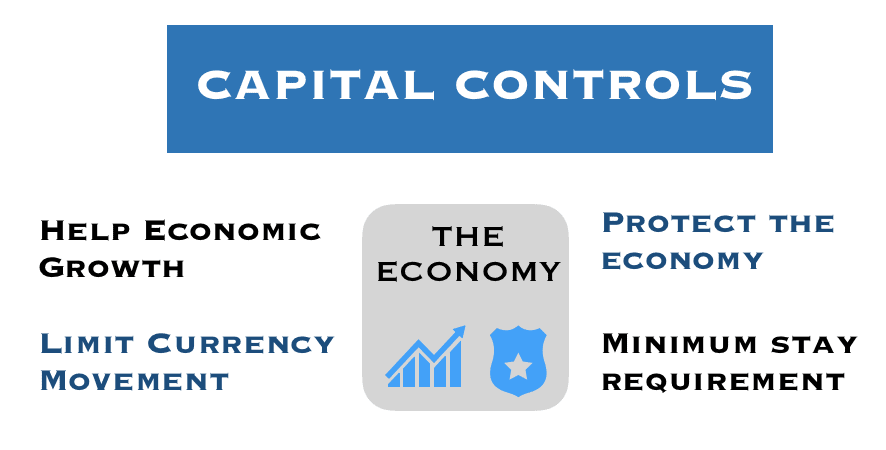Capital controls are measures to limit how much capital flows in and out of an economy. In other words, how much money enters and leaves a country.
A country’s government introduces the capital controls. For example, tariffs and volume restrictions are common capital control measures. Governments may also introduce legislation to reduce capital flows. The term ‘capital flows’ refers to the international movement of money for investment.
Apart from governments, central banks may also impose capital controls.
Developing countries tend to have more capital controls compared to the advanced economies. There is more control because developing countries have lower capital reserves than the advanced economies. Their economies are also more susceptible to volatility.
However, rich countries sometimes impose controls. They may do this either directly or indirectly. Canada, for example, has often been unwilling to let Chinese investors buy its natural resources companies.
Some controls have a minimum-stay requirement. In other words, money that comes in from abroad has to stay in the country for a minimum period. This occurred in Chile at the end of the last century.
Capital controls can hurt domestic production
Capital controls can affect the value of a currency, the availability of imported raw materials, and finished products. They may also affect equities and bonds. In fact, they may even influence the availability of domestic products.
For example, foreign currency restrictions make it harder to buy necessary foreign parts. A lack of foreign currency subsequently undermines the availability of products that some domestic producers make.
Capital controls may limit how much money you can take abroad or how much foreign currency you can buy. Governments may also restrict the sale of financial assets to foreign companies. Financial assets are intangible assets such as stocks, bonds, and bank deposits.Critics of capital controls sometimes backtrack
Most leaders of democratic nations are critical of capital controls. Critics argue that controls do more harm than good.
However, their commitment to free market principles often melt away when a financial crisis hits. This occurred during the Latin American debt crisis in the early 1980s and the Russian ruble crisis of 1998/99.
During the East Asian financial meltdown of the late 1990s governments changed policy rapidly.
In fact, even the advanced economies introduced capital controls during the global financial crisis of 2007/8.
Europe has seen three instances of capital controls since 2008. One in Iceland in 2008, another in the Republic of Cyprus (2013-2015), and the other in Greece (2015).
Arguments for capital controls
- Global economic growth was much higher after WWI during the Bretton Woods period. During this period, most countries introduced controls. However, when free capital movement returned after the 1970s, global growth slowed down.
- Domestic credit is available more cheaply when governments restrict people’s ownership of foreign assets.
- Economic crises have been more common since WWII during periods of no controls than when controls were widespread.
- Even economic historians who are against capital controls have acknowledged one thing. Controls have helped reduce the frequency of crises.
- Boom and bust cycles are partly due to free capital movement. These economic cycles harm a country’s GDP growth prospects. GDP stands for Gross Domestic Product.
Arguments against capital controls
- Savings go to where businesses use them most productively in a system with no controls.
- Foreign investment is crucial for developing countries. Controls reduce foreign investment. Furthermore, foreign investment often comes with know how. Developing countries benefit enormously from foreign know how.
- Raising funds for the Government from foreign markets is possible in systems with no control. Raising money abroad can also help a country recover from a recession.
- Borrowers and savers suffer because they cannot get the best available market rate when there are capital controls.
- Corruption is a big risk when controls include taxes. In other words, much of the money the government collects is stolen by corrupt government officials.
- Black markets thrive when there are controls. Often, the black market exchange rate becomes the ‘official rate’ because nobody trusts government figures. This has occurred in Venezuela. In fact, in Venezuela, local and international media quote the black market rate for the Bolivar.
– Many economists say controls are an excuse to postpone reforms.

